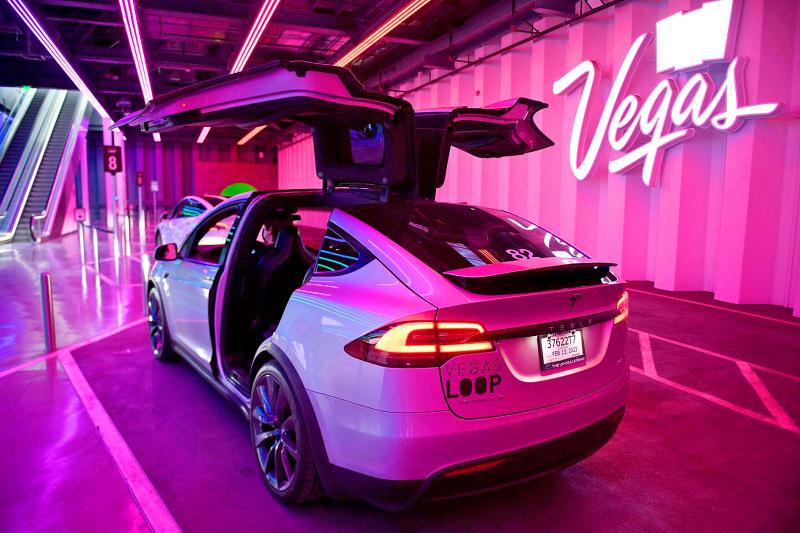Tesla Inc has agreed to purchase nickel supplies from miner Talon Metals Corp as an expected surge in demand spurs automakers to secure access to battery metals and other parts for electric vehicles.
Tesla committed to purchase 75,000 tonnes of nickel concentrates produced from Talon’s Tamarack project, with the price linked to the London Metal Exchange’s cash-settlement price for nickel, Talon said in a statement on Monday.
Tamarack, a nickel, copper and cobalt joint venture between Talon and Rio Tinto Group, is located in Minnesota and is not yet in commercial production.

Photo: AFP
Tesla chief executive officer Elon Musk has repeatedly expressed concern about supplies of nickel due to challenges in sustainable sourcing, with demand set to skyrocket as the world increasingly moves toward electric vehicles.
The agreement with Talon comes less than six months after Tesla struck a nickel-supply deal with BHP Group.
The announcement also follows a flurry of activity among automakers securing supplies of nickel and other materials needed to produce batteries to power the green-energy transition.
BHP, the world’s biggest miner, on Monday said that it would buy a minority stake in a Tanzanian nickel project as it expands its footprint, while General Motors Co last month said that it would build a plant to make magnets using rare-earth materials supplied by MP Materials Corp.
US President Joe Biden’s administration has pledged to invest in US domestic manufacturing and move away from reliance on adversaries for critical inputs.
In October last year, Tesla said higher prices of nickel were having an impact on battery cells.
Talon said it would use “commercially reasonable efforts” to achieve commercial production by Jan. 1, 2026, at the Tamarack project, which might be extended by the agreement of the parties for up to 12 months.
“Rio Tinto is working to support Talon to bring the Tamarack mine into production, as we strengthen our battery materials portfolio,” Rio Tinto Minerals chief executive officer Sinead Kaufman said in a statement. “We look forward to seeing it supply Tesla with nickel that is essential for the production of their electric vehicles.”

The Eurovision Song Contest has seen a surge in punter interest at the bookmakers, becoming a major betting event, experts said ahead of last night’s giant glamfest in Basel. “Eurovision has quietly become one of the biggest betting events of the year,” said Tomi Huttunen, senior manager of the Online Computer Finland (OCS) betting and casino platform. Betting sites have long been used to gauge which way voters might be leaning ahead of the world’s biggest televised live music event. However, bookmakers highlight a huge increase in engagement in recent years — and this year in particular. “We’ve already passed 2023’s total activity and

Nvidia Corp CEO Jensen Huang (黃仁勳) today announced that his company has selected "Beitou Shilin" in Taipei for its new Taiwan office, called Nvidia Constellation, putting an end to months of speculation. Industry sources have said that the tech giant has been eyeing the Beitou Shilin Science Park as the site of its new overseas headquarters, and speculated that the new headquarters would be built on two plots of land designated as "T17" and "T18," which span 3.89 hectares in the park. "I think it's time for us to reveal one of the largest products we've ever built," Huang said near the

China yesterday announced anti-dumping duties as high as 74.9 percent on imports of polyoxymethylene (POM) copolymers, a type of engineering plastic, from Taiwan, the US, the EU and Japan. The Chinese Ministry of Commerce’s findings conclude a probe launched in May last year, shortly after the US sharply increased tariffs on Chinese electric vehicles, computer chips and other imports. POM copolymers can partially replace metals such as copper and zinc, and have various applications, including in auto parts, electronics and medical equipment, the Chinese ministry has said. In January, it said initial investigations had determined that dumping was taking place, and implemented preliminary

Intel Corp yesterday reinforced its determination to strengthen its partnerships with Taiwan’s ecosystem partners including original-electronic-manufacturing (OEM) companies such as Hon Hai Precision Industry Co (鴻海精密) and chipmaker United Microelectronics Corp (UMC, 聯電). “Tonight marks a new beginning. We renew our new partnership with Taiwan ecosystem,” Intel new chief executive officer Tan Lip-bu (陳立武) said at a dinner with representatives from the company’s local partners, celebrating the 40th anniversary of the US chip giant’s presence in Taiwan. Tan took the reins at Intel six weeks ago aiming to reform the chipmaker and revive its past glory. This is the first time Tan